The Travel and Tourism Sector: A Comprehensive Report
VerifiedAdded on 2020/01/21
|11
|3665
|113
Report
AI Summary
This report, prepared for a BTEC HND Travel and Tourism Management module, provides a comprehensive analysis of the travel and tourism sector. It begins with an introduction to the sector and its increasing market presence, highlighting key companies like TUI and the historical development of travel and tourism, including pre- and post-world war eras, the modern age, and future trends. The report then examines the structure of the travel and tourism sector, covering travel planning, transportation, accommodation, local travel, food and shopping, and tourist sites. It also explores the implications of political changes on the sector, emphasizing the impact on country relationships and economic development. Furthermore, the report delves into factors affecting travel and tourism demand, such as government policies, service quality, relationships, agents, culture, and ethics. It also discusses how supply has adapted to meet effective demand, including supply chain management, quality, pricing, and planning. Finally, the report evaluates the positive and negative impacts of the sector on the environment, economy, and society, and proposes strategies for minimizing negative impacts and maximizing positive ones. The report concludes with a summary of key findings and references.
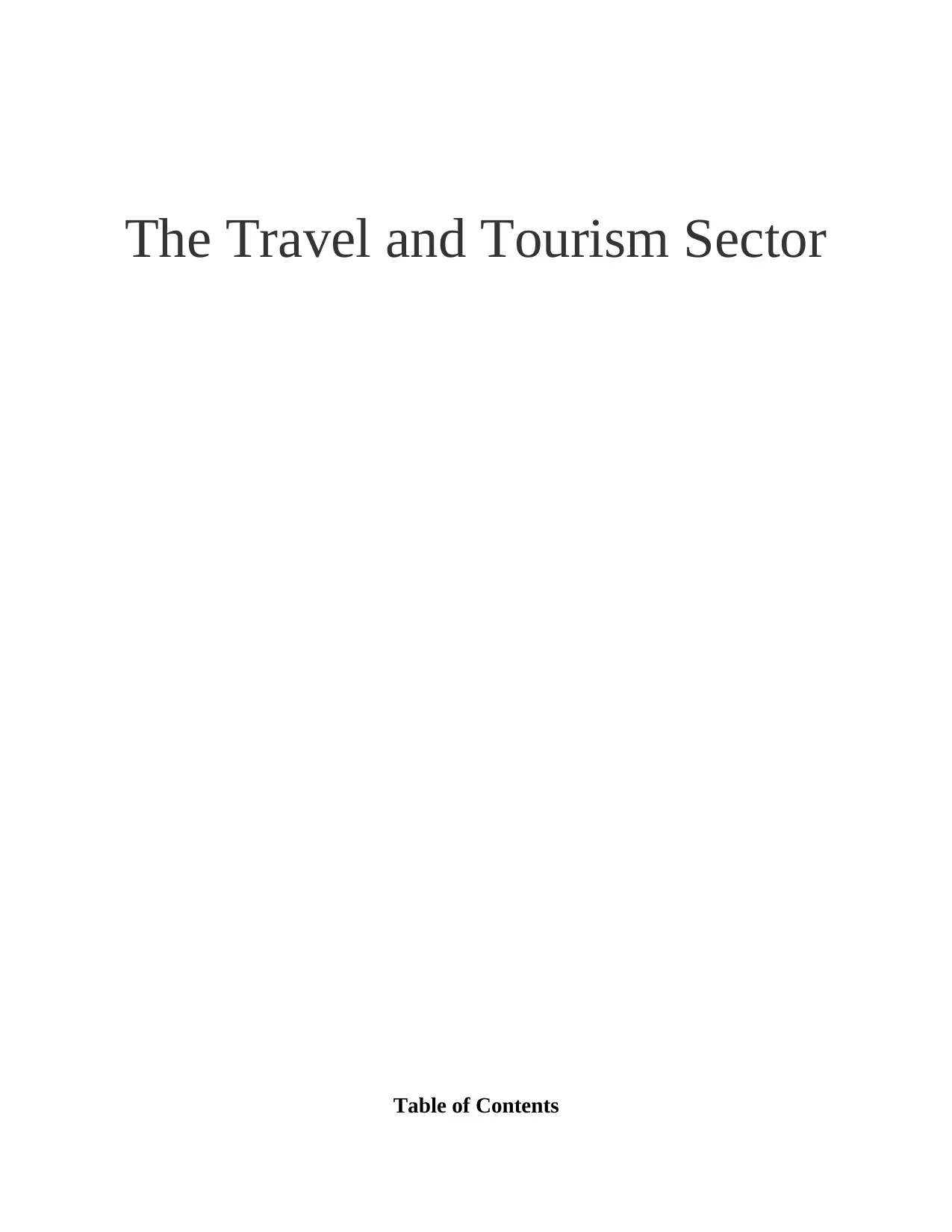
The Travel and Tourism Sector
Table of Contents
Table of Contents
Paraphrase This Document
Need a fresh take? Get an instant paraphrase of this document with our AI Paraphraser
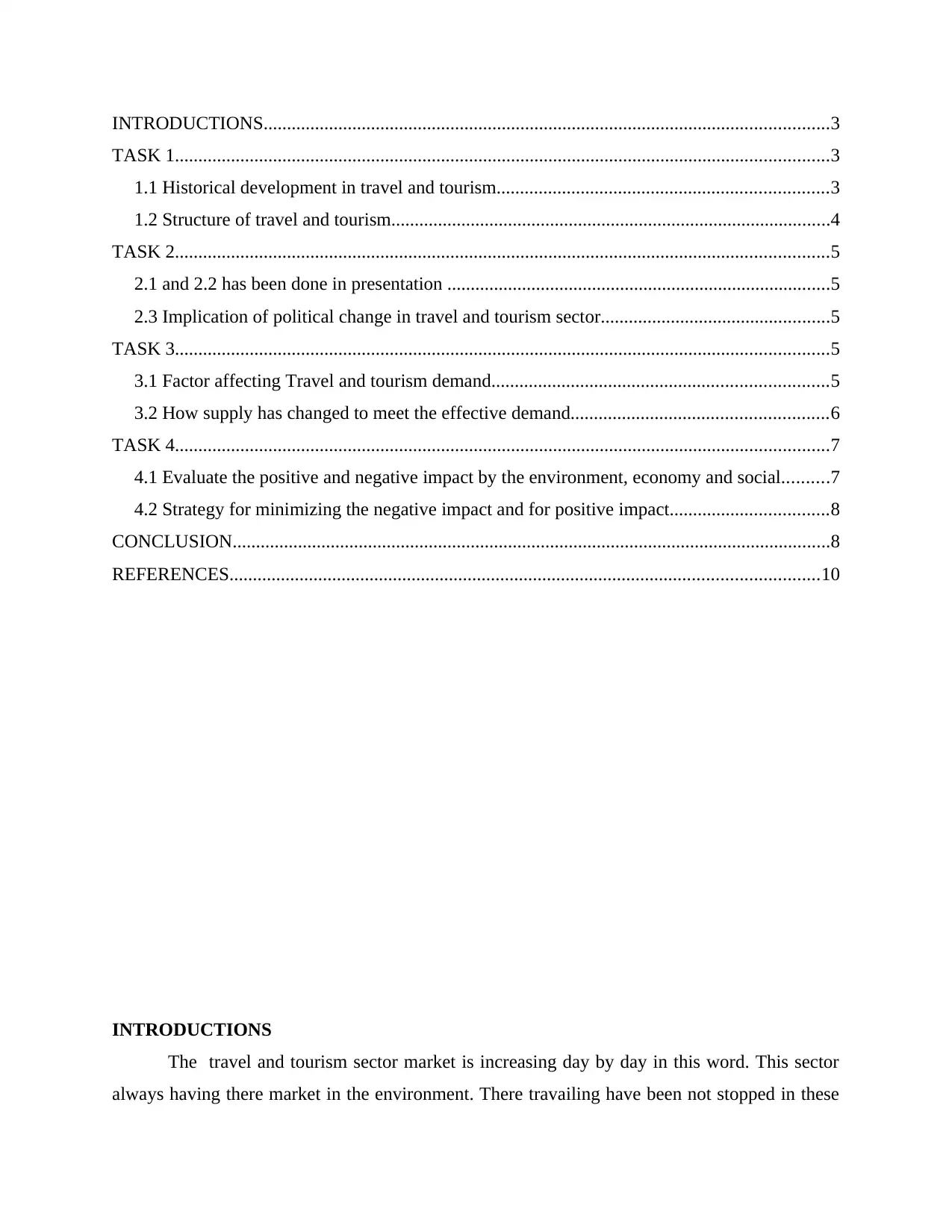
INTRODUCTIONS.........................................................................................................................3
TASK 1............................................................................................................................................3
1.1 Historical development in travel and tourism.......................................................................3
1.2 Structure of travel and tourism..............................................................................................4
TASK 2............................................................................................................................................5
2.1 and 2.2 has been done in presentation ..................................................................................5
2.3 Implication of political change in travel and tourism sector.................................................5
TASK 3............................................................................................................................................5
3.1 Factor affecting Travel and tourism demand........................................................................5
3.2 How supply has changed to meet the effective demand.......................................................6
TASK 4............................................................................................................................................7
4.1 Evaluate the positive and negative impact by the environment, economy and social..........7
4.2 Strategy for minimizing the negative impact and for positive impact..................................8
CONCLUSION................................................................................................................................8
REFERENCES..............................................................................................................................10
INTRODUCTIONS
The travel and tourism sector market is increasing day by day in this word. This sector
always having there market in the environment. There travailing have been not stopped in these
TASK 1............................................................................................................................................3
1.1 Historical development in travel and tourism.......................................................................3
1.2 Structure of travel and tourism..............................................................................................4
TASK 2............................................................................................................................................5
2.1 and 2.2 has been done in presentation ..................................................................................5
2.3 Implication of political change in travel and tourism sector.................................................5
TASK 3............................................................................................................................................5
3.1 Factor affecting Travel and tourism demand........................................................................5
3.2 How supply has changed to meet the effective demand.......................................................6
TASK 4............................................................................................................................................7
4.1 Evaluate the positive and negative impact by the environment, economy and social..........7
4.2 Strategy for minimizing the negative impact and for positive impact..................................8
CONCLUSION................................................................................................................................8
REFERENCES..............................................................................................................................10
INTRODUCTIONS
The travel and tourism sector market is increasing day by day in this word. This sector
always having there market in the environment. There travailing have been not stopped in these
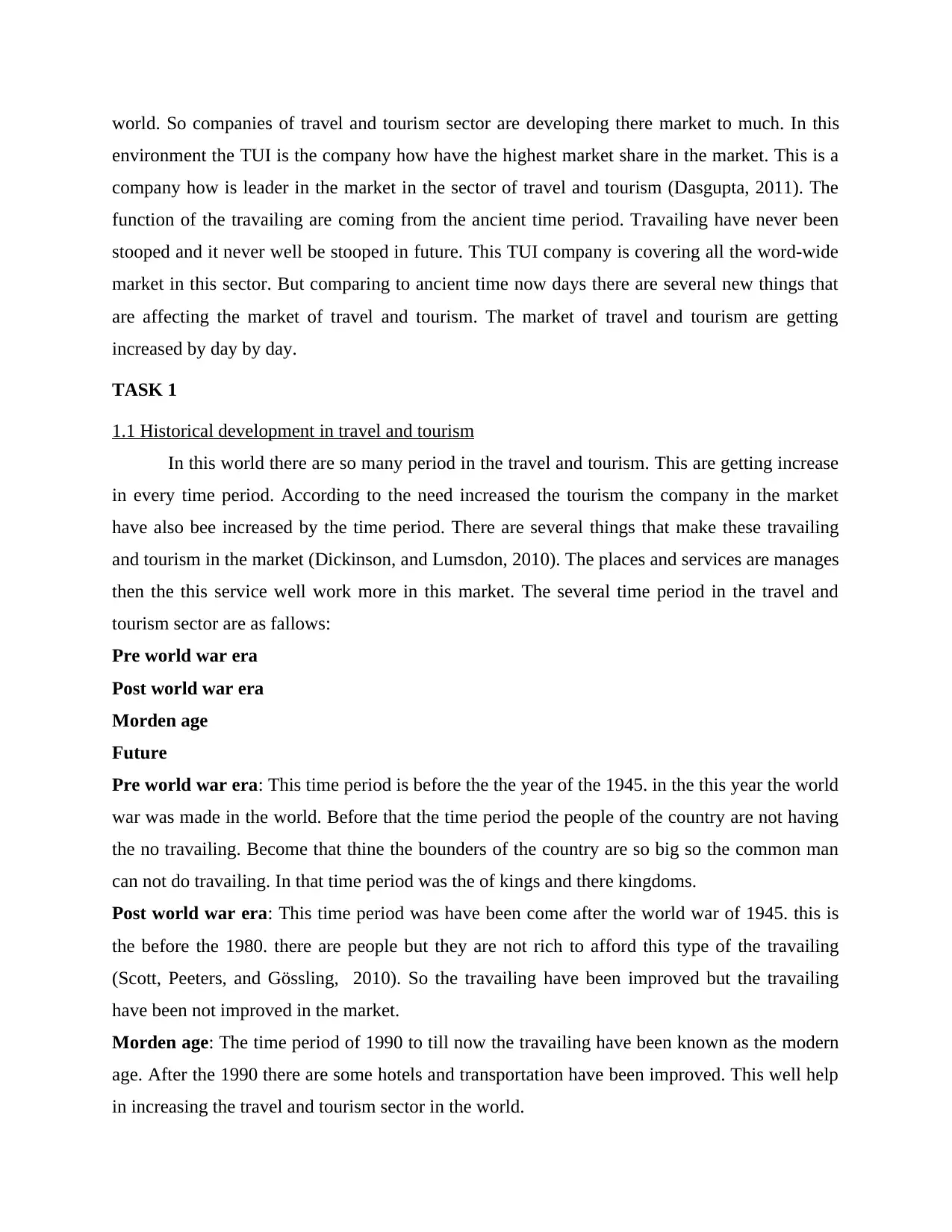
world. So companies of travel and tourism sector are developing there market to much. In this
environment the TUI is the company how have the highest market share in the market. This is a
company how is leader in the market in the sector of travel and tourism (Dasgupta, 2011). The
function of the travailing are coming from the ancient time period. Travailing have never been
stooped and it never well be stooped in future. This TUI company is covering all the word-wide
market in this sector. But comparing to ancient time now days there are several new things that
are affecting the market of travel and tourism. The market of travel and tourism are getting
increased by day by day.
TASK 1
1.1 Historical development in travel and tourism
In this world there are so many period in the travel and tourism. This are getting increase
in every time period. According to the need increased the tourism the company in the market
have also bee increased by the time period. There are several things that make these travailing
and tourism in the market (Dickinson, and Lumsdon, 2010). The places and services are manages
then the this service well work more in this market. The several time period in the travel and
tourism sector are as fallows:
Pre world war era
Post world war era
Morden age
Future
Pre world war era: This time period is before the the year of the 1945. in the this year the world
war was made in the world. Before that the time period the people of the country are not having
the no travailing. Become that thine the bounders of the country are so big so the common man
can not do travailing. In that time period was the of kings and there kingdoms.
Post world war era: This time period was have been come after the world war of 1945. this is
the before the 1980. there are people but they are not rich to afford this type of the travailing
(Scott, Peeters, and Gössling, 2010). So the travailing have been improved but the travailing
have been not improved in the market.
Morden age: The time period of 1990 to till now the travailing have been known as the modern
age. After the 1990 there are some hotels and transportation have been improved. This well help
in increasing the travel and tourism sector in the world.
environment the TUI is the company how have the highest market share in the market. This is a
company how is leader in the market in the sector of travel and tourism (Dasgupta, 2011). The
function of the travailing are coming from the ancient time period. Travailing have never been
stooped and it never well be stooped in future. This TUI company is covering all the word-wide
market in this sector. But comparing to ancient time now days there are several new things that
are affecting the market of travel and tourism. The market of travel and tourism are getting
increased by day by day.
TASK 1
1.1 Historical development in travel and tourism
In this world there are so many period in the travel and tourism. This are getting increase
in every time period. According to the need increased the tourism the company in the market
have also bee increased by the time period. There are several things that make these travailing
and tourism in the market (Dickinson, and Lumsdon, 2010). The places and services are manages
then the this service well work more in this market. The several time period in the travel and
tourism sector are as fallows:
Pre world war era
Post world war era
Morden age
Future
Pre world war era: This time period is before the the year of the 1945. in the this year the world
war was made in the world. Before that the time period the people of the country are not having
the no travailing. Become that thine the bounders of the country are so big so the common man
can not do travailing. In that time period was the of kings and there kingdoms.
Post world war era: This time period was have been come after the world war of 1945. this is
the before the 1980. there are people but they are not rich to afford this type of the travailing
(Scott, Peeters, and Gössling, 2010). So the travailing have been improved but the travailing
have been not improved in the market.
Morden age: The time period of 1990 to till now the travailing have been known as the modern
age. After the 1990 there are some hotels and transportation have been improved. This well help
in increasing the travel and tourism sector in the world.
⊘ This is a preview!⊘
Do you want full access?
Subscribe today to unlock all pages.

Trusted by 1+ million students worldwide
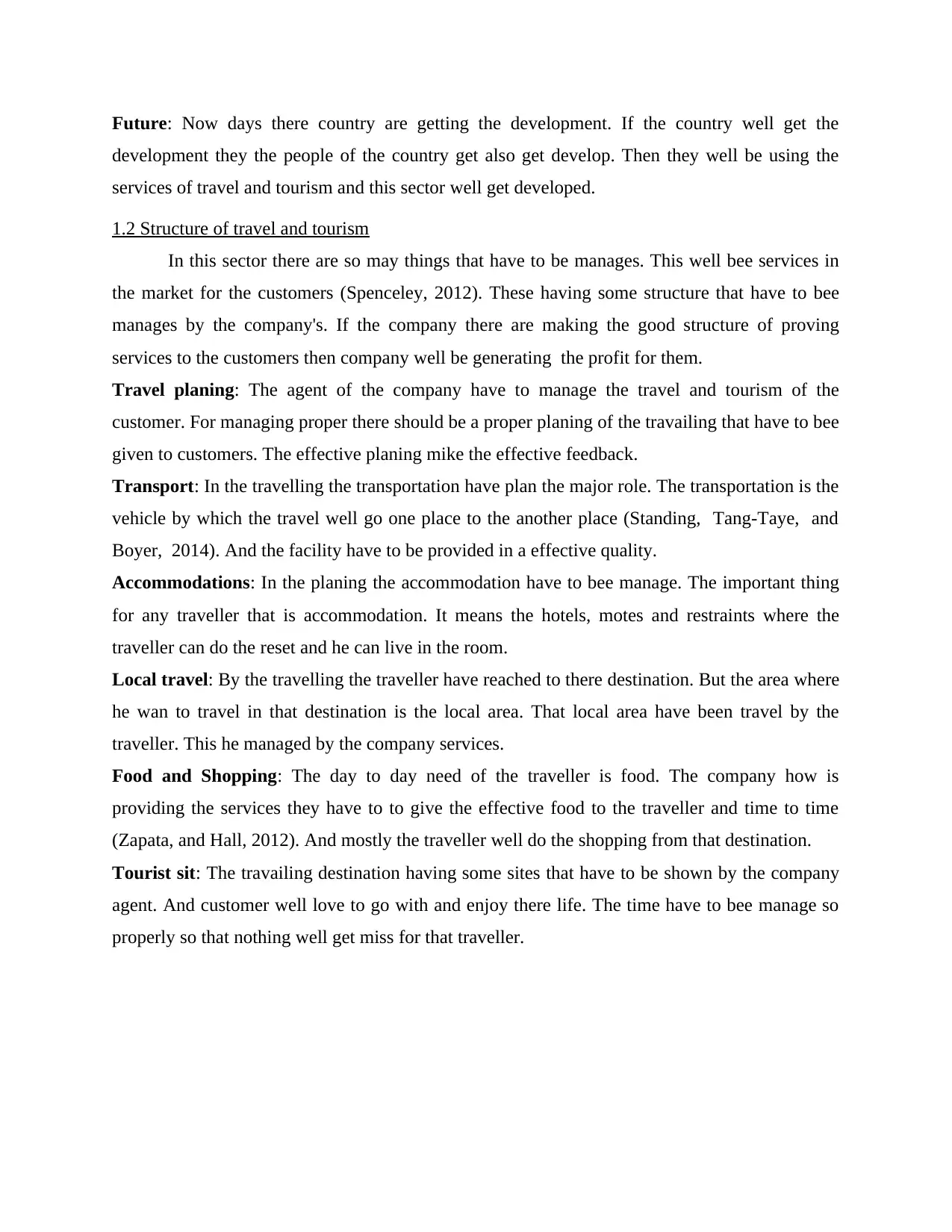
Future: Now days there country are getting the development. If the country well get the
development they the people of the country get also get develop. Then they well be using the
services of travel and tourism and this sector well get developed.
1.2 Structure of travel and tourism
In this sector there are so may things that have to be manages. This well bee services in
the market for the customers (Spenceley, 2012). These having some structure that have to bee
manages by the company's. If the company there are making the good structure of proving
services to the customers then company well be generating the profit for them.
Travel planing: The agent of the company have to manage the travel and tourism of the
customer. For managing proper there should be a proper planing of the travailing that have to bee
given to customers. The effective planing mike the effective feedback.
Transport: In the travelling the transportation have plan the major role. The transportation is the
vehicle by which the travel well go one place to the another place (Standing, Tang-Taye, and
Boyer, 2014). And the facility have to be provided in a effective quality.
Accommodations: In the planing the accommodation have to bee manage. The important thing
for any traveller that is accommodation. It means the hotels, motes and restraints where the
traveller can do the reset and he can live in the room.
Local travel: By the travelling the traveller have reached to there destination. But the area where
he wan to travel in that destination is the local area. That local area have been travel by the
traveller. This he managed by the company services.
Food and Shopping: The day to day need of the traveller is food. The company how is
providing the services they have to to give the effective food to the traveller and time to time
(Zapata, and Hall, 2012). And mostly the traveller well do the shopping from that destination.
Tourist sit: The travailing destination having some sites that have to be shown by the company
agent. And customer well love to go with and enjoy there life. The time have to bee manage so
properly so that nothing well get miss for that traveller.
development they the people of the country get also get develop. Then they well be using the
services of travel and tourism and this sector well get developed.
1.2 Structure of travel and tourism
In this sector there are so may things that have to be manages. This well bee services in
the market for the customers (Spenceley, 2012). These having some structure that have to bee
manages by the company's. If the company there are making the good structure of proving
services to the customers then company well be generating the profit for them.
Travel planing: The agent of the company have to manage the travel and tourism of the
customer. For managing proper there should be a proper planing of the travailing that have to bee
given to customers. The effective planing mike the effective feedback.
Transport: In the travelling the transportation have plan the major role. The transportation is the
vehicle by which the travel well go one place to the another place (Standing, Tang-Taye, and
Boyer, 2014). And the facility have to be provided in a effective quality.
Accommodations: In the planing the accommodation have to bee manage. The important thing
for any traveller that is accommodation. It means the hotels, motes and restraints where the
traveller can do the reset and he can live in the room.
Local travel: By the travelling the traveller have reached to there destination. But the area where
he wan to travel in that destination is the local area. That local area have been travel by the
traveller. This he managed by the company services.
Food and Shopping: The day to day need of the traveller is food. The company how is
providing the services they have to to give the effective food to the traveller and time to time
(Zapata, and Hall, 2012). And mostly the traveller well do the shopping from that destination.
Tourist sit: The travailing destination having some sites that have to be shown by the company
agent. And customer well love to go with and enjoy there life. The time have to bee manage so
properly so that nothing well get miss for that traveller.
Paraphrase This Document
Need a fresh take? Get an instant paraphrase of this document with our AI Paraphraser
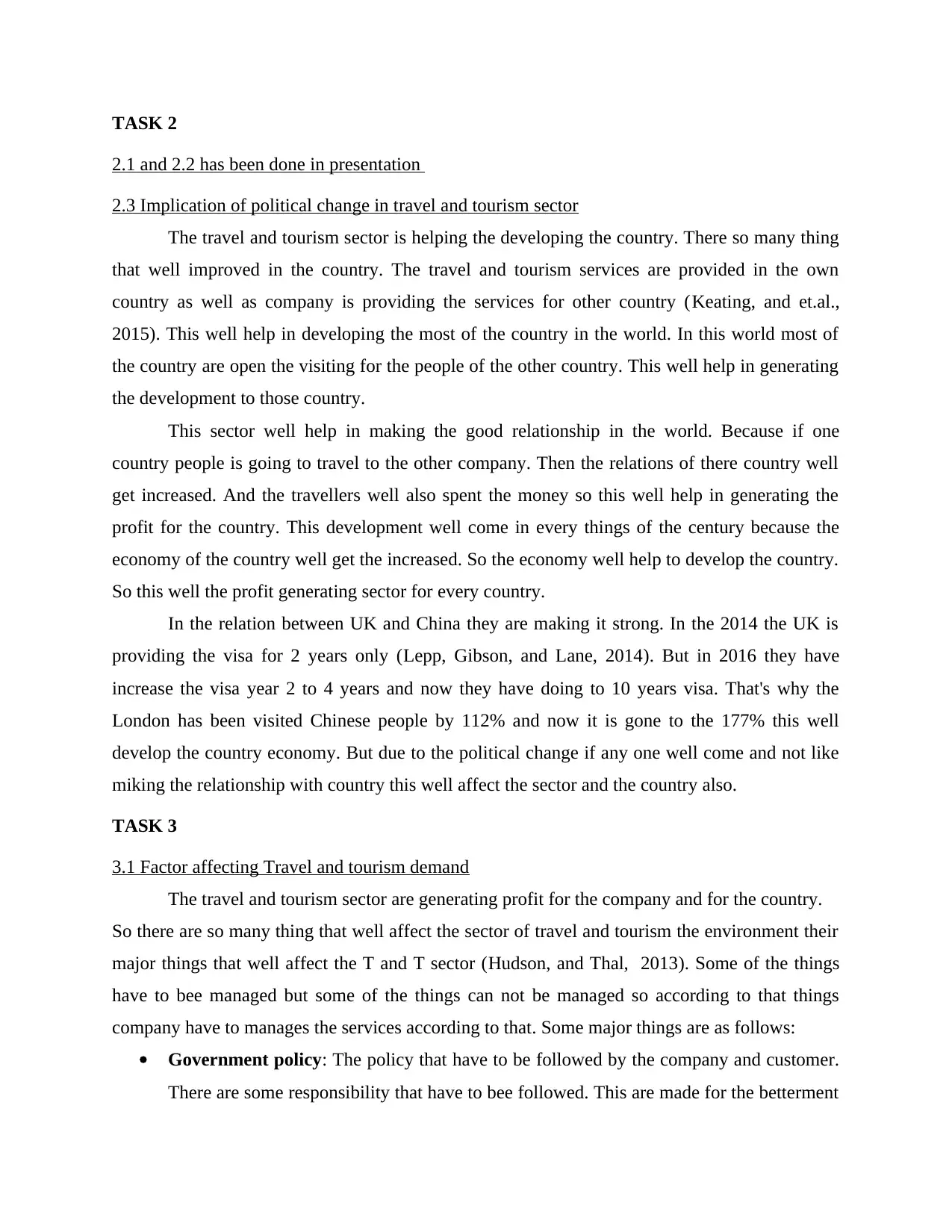
TASK 2
2.1 and 2.2 has been done in presentation
2.3 Implication of political change in travel and tourism sector
The travel and tourism sector is helping the developing the country. There so many thing
that well improved in the country. The travel and tourism services are provided in the own
country as well as company is providing the services for other country (Keating, and et.al.,
2015). This well help in developing the most of the country in the world. In this world most of
the country are open the visiting for the people of the other country. This well help in generating
the development to those country.
This sector well help in making the good relationship in the world. Because if one
country people is going to travel to the other company. Then the relations of there country well
get increased. And the travellers well also spent the money so this well help in generating the
profit for the country. This development well come in every things of the century because the
economy of the country well get the increased. So the economy well help to develop the country.
So this well the profit generating sector for every country.
In the relation between UK and China they are making it strong. In the 2014 the UK is
providing the visa for 2 years only (Lepp, Gibson, and Lane, 2014). But in 2016 they have
increase the visa year 2 to 4 years and now they have doing to 10 years visa. That's why the
London has been visited Chinese people by 112% and now it is gone to the 177% this well
develop the country economy. But due to the political change if any one well come and not like
miking the relationship with country this well affect the sector and the country also.
TASK 3
3.1 Factor affecting Travel and tourism demand
The travel and tourism sector are generating profit for the company and for the country.
So there are so many thing that well affect the sector of travel and tourism the environment their
major things that well affect the T and T sector (Hudson, and Thal, 2013). Some of the things
have to bee managed but some of the things can not be managed so according to that things
company have to manages the services according to that. Some major things are as follows:
Government policy: The policy that have to be followed by the company and customer.
There are some responsibility that have to bee followed. This are made for the betterment
2.1 and 2.2 has been done in presentation
2.3 Implication of political change in travel and tourism sector
The travel and tourism sector is helping the developing the country. There so many thing
that well improved in the country. The travel and tourism services are provided in the own
country as well as company is providing the services for other country (Keating, and et.al.,
2015). This well help in developing the most of the country in the world. In this world most of
the country are open the visiting for the people of the other country. This well help in generating
the development to those country.
This sector well help in making the good relationship in the world. Because if one
country people is going to travel to the other company. Then the relations of there country well
get increased. And the travellers well also spent the money so this well help in generating the
profit for the country. This development well come in every things of the century because the
economy of the country well get the increased. So the economy well help to develop the country.
So this well the profit generating sector for every country.
In the relation between UK and China they are making it strong. In the 2014 the UK is
providing the visa for 2 years only (Lepp, Gibson, and Lane, 2014). But in 2016 they have
increase the visa year 2 to 4 years and now they have doing to 10 years visa. That's why the
London has been visited Chinese people by 112% and now it is gone to the 177% this well
develop the country economy. But due to the political change if any one well come and not like
miking the relationship with country this well affect the sector and the country also.
TASK 3
3.1 Factor affecting Travel and tourism demand
The travel and tourism sector are generating profit for the company and for the country.
So there are so many thing that well affect the sector of travel and tourism the environment their
major things that well affect the T and T sector (Hudson, and Thal, 2013). Some of the things
have to bee managed but some of the things can not be managed so according to that things
company have to manages the services according to that. Some major things are as follows:
Government policy: The policy that have to be followed by the company and customer.
There are some responsibility that have to bee followed. This are made for the betterment
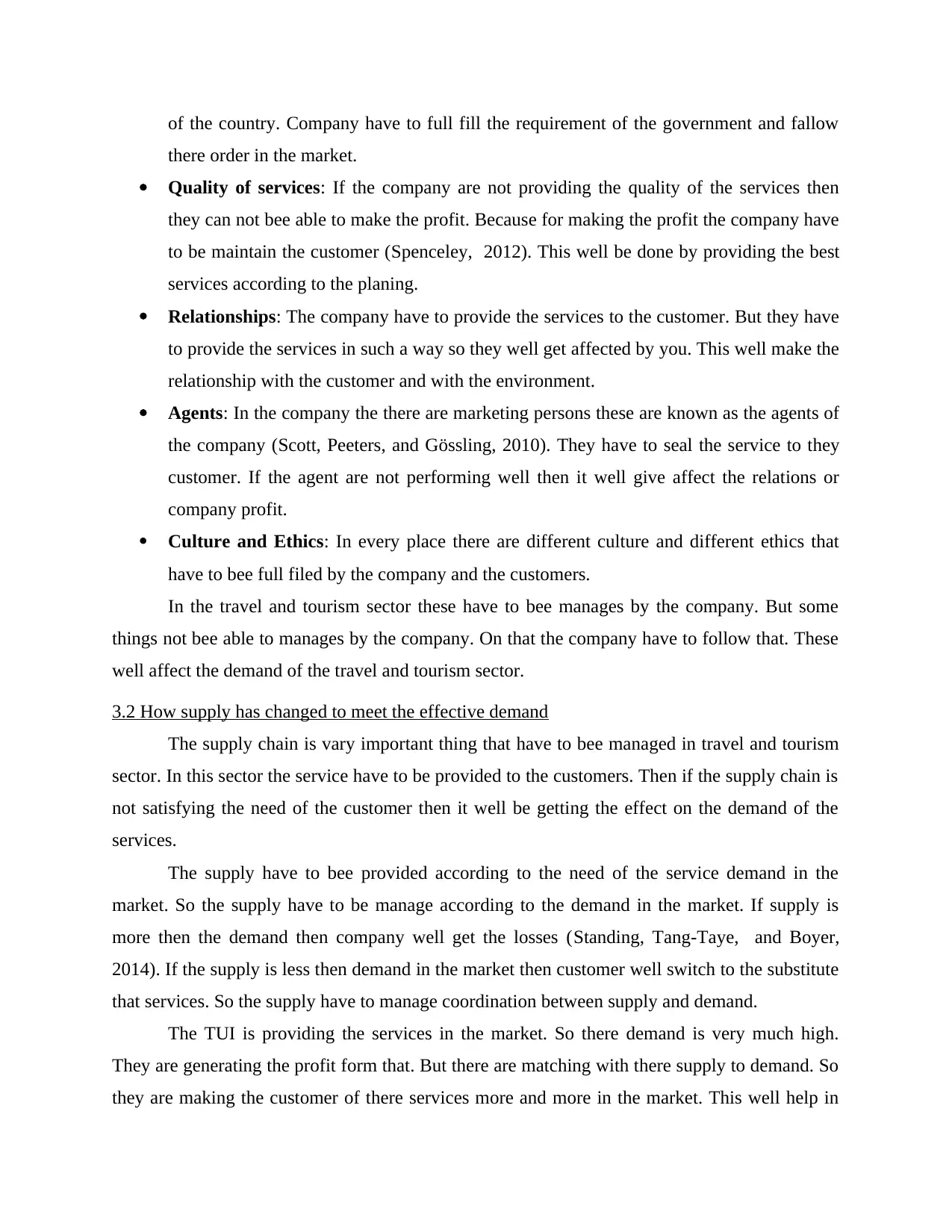
of the country. Company have to full fill the requirement of the government and fallow
there order in the market.
Quality of services: If the company are not providing the quality of the services then
they can not bee able to make the profit. Because for making the profit the company have
to be maintain the customer (Spenceley, 2012). This well be done by providing the best
services according to the planing.
Relationships: The company have to provide the services to the customer. But they have
to provide the services in such a way so they well get affected by you. This well make the
relationship with the customer and with the environment.
Agents: In the company the there are marketing persons these are known as the agents of
the company (Scott, Peeters, and Gössling, 2010). They have to seal the service to they
customer. If the agent are not performing well then it well give affect the relations or
company profit.
Culture and Ethics: In every place there are different culture and different ethics that
have to bee full filed by the company and the customers.
In the travel and tourism sector these have to bee manages by the company. But some
things not bee able to manages by the company. On that the company have to follow that. These
well affect the demand of the travel and tourism sector.
3.2 How supply has changed to meet the effective demand
The supply chain is vary important thing that have to bee managed in travel and tourism
sector. In this sector the service have to be provided to the customers. Then if the supply chain is
not satisfying the need of the customer then it well be getting the effect on the demand of the
services.
The supply have to bee provided according to the need of the service demand in the
market. So the supply have to be manage according to the demand in the market. If supply is
more then the demand then company well get the losses (Standing, Tang-Taye, and Boyer,
2014). If the supply is less then demand in the market then customer well switch to the substitute
that services. So the supply have to manage coordination between supply and demand.
The TUI is providing the services in the market. So there demand is very much high.
They are generating the profit form that. But there are matching with there supply to demand. So
they are making the customer of there services more and more in the market. This well help in
there order in the market.
Quality of services: If the company are not providing the quality of the services then
they can not bee able to make the profit. Because for making the profit the company have
to be maintain the customer (Spenceley, 2012). This well be done by providing the best
services according to the planing.
Relationships: The company have to provide the services to the customer. But they have
to provide the services in such a way so they well get affected by you. This well make the
relationship with the customer and with the environment.
Agents: In the company the there are marketing persons these are known as the agents of
the company (Scott, Peeters, and Gössling, 2010). They have to seal the service to they
customer. If the agent are not performing well then it well give affect the relations or
company profit.
Culture and Ethics: In every place there are different culture and different ethics that
have to bee full filed by the company and the customers.
In the travel and tourism sector these have to bee manages by the company. But some
things not bee able to manages by the company. On that the company have to follow that. These
well affect the demand of the travel and tourism sector.
3.2 How supply has changed to meet the effective demand
The supply chain is vary important thing that have to bee managed in travel and tourism
sector. In this sector the service have to be provided to the customers. Then if the supply chain is
not satisfying the need of the customer then it well be getting the effect on the demand of the
services.
The supply have to bee provided according to the need of the service demand in the
market. So the supply have to be manage according to the demand in the market. If supply is
more then the demand then company well get the losses (Standing, Tang-Taye, and Boyer,
2014). If the supply is less then demand in the market then customer well switch to the substitute
that services. So the supply have to manage coordination between supply and demand.
The TUI is providing the services in the market. So there demand is very much high.
They are generating the profit form that. But there are matching with there supply to demand. So
they are making the customer of there services more and more in the market. This well help in
⊘ This is a preview!⊘
Do you want full access?
Subscribe today to unlock all pages.

Trusted by 1+ million students worldwide
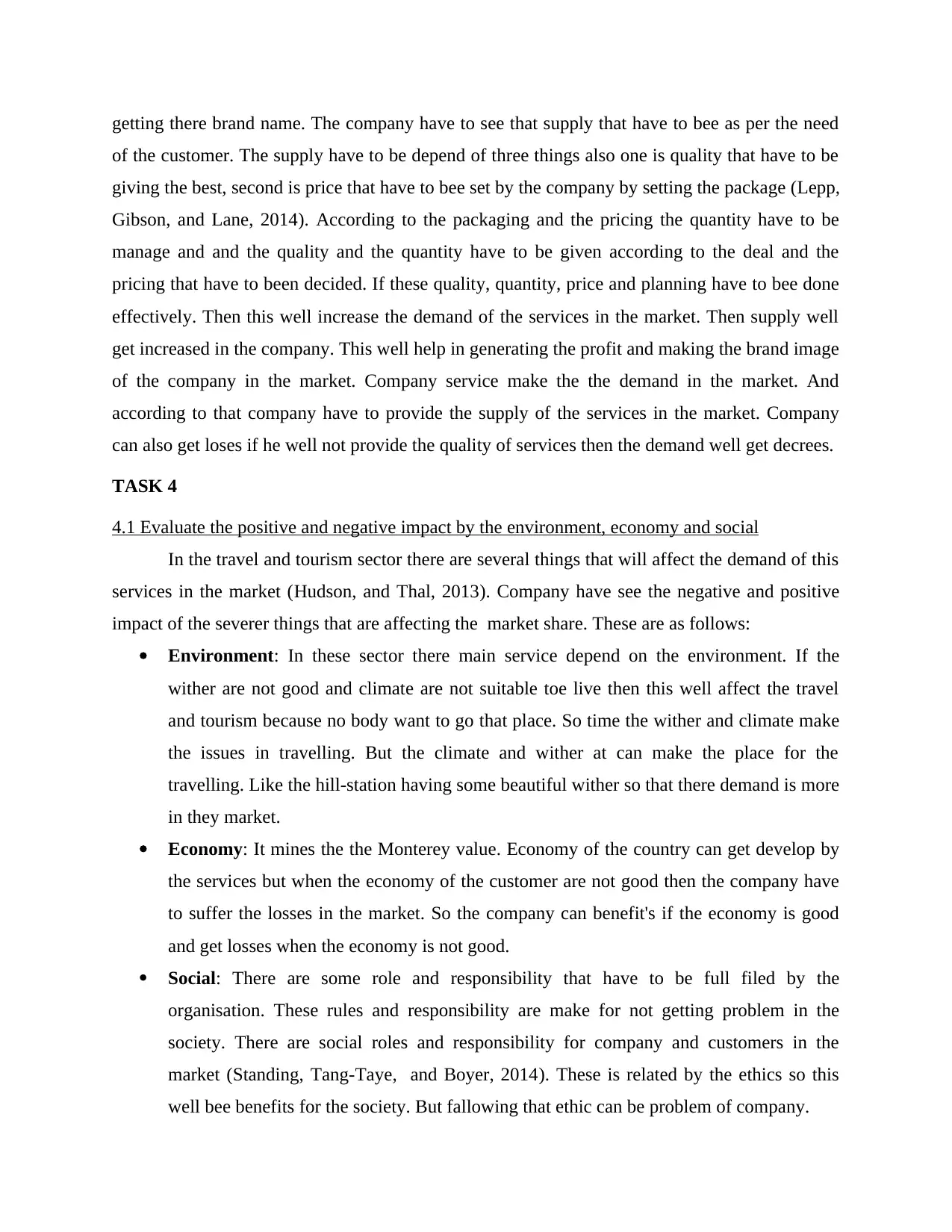
getting there brand name. The company have to see that supply that have to bee as per the need
of the customer. The supply have to be depend of three things also one is quality that have to be
giving the best, second is price that have to bee set by the company by setting the package (Lepp,
Gibson, and Lane, 2014). According to the packaging and the pricing the quantity have to be
manage and and the quality and the quantity have to be given according to the deal and the
pricing that have to been decided. If these quality, quantity, price and planning have to bee done
effectively. Then this well increase the demand of the services in the market. Then supply well
get increased in the company. This well help in generating the profit and making the brand image
of the company in the market. Company service make the the demand in the market. And
according to that company have to provide the supply of the services in the market. Company
can also get loses if he well not provide the quality of services then the demand well get decrees.
TASK 4
4.1 Evaluate the positive and negative impact by the environment, economy and social
In the travel and tourism sector there are several things that will affect the demand of this
services in the market (Hudson, and Thal, 2013). Company have see the negative and positive
impact of the severer things that are affecting the market share. These are as follows:
Environment: In these sector there main service depend on the environment. If the
wither are not good and climate are not suitable toe live then this well affect the travel
and tourism because no body want to go that place. So time the wither and climate make
the issues in travelling. But the climate and wither at can make the place for the
travelling. Like the hill-station having some beautiful wither so that there demand is more
in they market.
Economy: It mines the the Monterey value. Economy of the country can get develop by
the services but when the economy of the customer are not good then the company have
to suffer the losses in the market. So the company can benefit's if the economy is good
and get losses when the economy is not good.
Social: There are some role and responsibility that have to be full filed by the
organisation. These rules and responsibility are make for not getting problem in the
society. There are social roles and responsibility for company and customers in the
market (Standing, Tang-Taye, and Boyer, 2014). These is related by the ethics so this
well bee benefits for the society. But fallowing that ethic can be problem of company.
of the customer. The supply have to be depend of three things also one is quality that have to be
giving the best, second is price that have to bee set by the company by setting the package (Lepp,
Gibson, and Lane, 2014). According to the packaging and the pricing the quantity have to be
manage and and the quality and the quantity have to be given according to the deal and the
pricing that have to been decided. If these quality, quantity, price and planning have to bee done
effectively. Then this well increase the demand of the services in the market. Then supply well
get increased in the company. This well help in generating the profit and making the brand image
of the company in the market. Company service make the the demand in the market. And
according to that company have to provide the supply of the services in the market. Company
can also get loses if he well not provide the quality of services then the demand well get decrees.
TASK 4
4.1 Evaluate the positive and negative impact by the environment, economy and social
In the travel and tourism sector there are several things that will affect the demand of this
services in the market (Hudson, and Thal, 2013). Company have see the negative and positive
impact of the severer things that are affecting the market share. These are as follows:
Environment: In these sector there main service depend on the environment. If the
wither are not good and climate are not suitable toe live then this well affect the travel
and tourism because no body want to go that place. So time the wither and climate make
the issues in travelling. But the climate and wither at can make the place for the
travelling. Like the hill-station having some beautiful wither so that there demand is more
in they market.
Economy: It mines the the Monterey value. Economy of the country can get develop by
the services but when the economy of the customer are not good then the company have
to suffer the losses in the market. So the company can benefit's if the economy is good
and get losses when the economy is not good.
Social: There are some role and responsibility that have to be full filed by the
organisation. These rules and responsibility are make for not getting problem in the
society. There are social roles and responsibility for company and customers in the
market (Standing, Tang-Taye, and Boyer, 2014). These is related by the ethics so this
well bee benefits for the society. But fallowing that ethic can be problem of company.
Paraphrase This Document
Need a fresh take? Get an instant paraphrase of this document with our AI Paraphraser
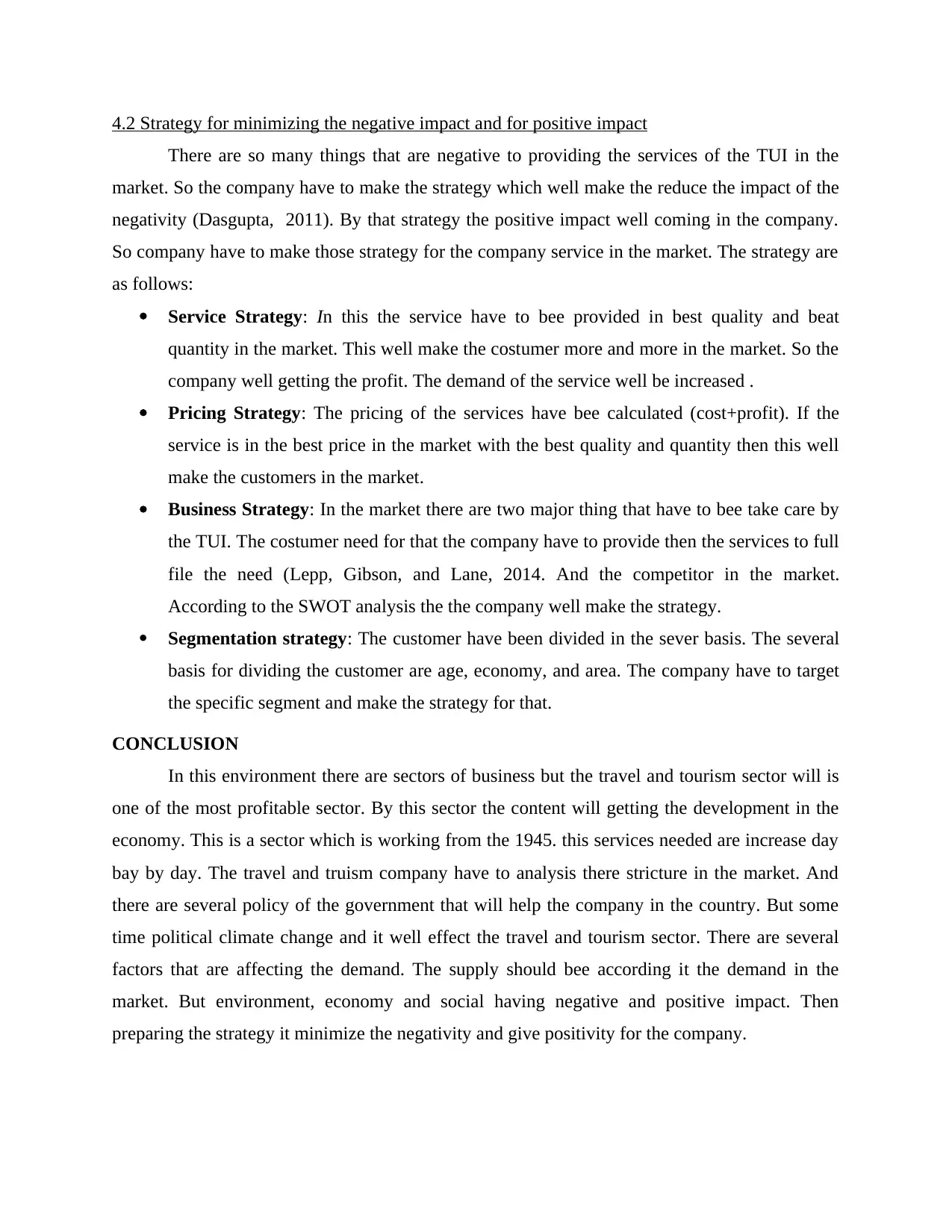
4.2 Strategy for minimizing the negative impact and for positive impact
There are so many things that are negative to providing the services of the TUI in the
market. So the company have to make the strategy which well make the reduce the impact of the
negativity (Dasgupta, 2011). By that strategy the positive impact well coming in the company.
So company have to make those strategy for the company service in the market. The strategy are
as follows:
Service Strategy: In this the service have to bee provided in best quality and beat
quantity in the market. This well make the costumer more and more in the market. So the
company well getting the profit. The demand of the service well be increased .
Pricing Strategy: The pricing of the services have bee calculated (cost+profit). If the
service is in the best price in the market with the best quality and quantity then this well
make the customers in the market.
Business Strategy: In the market there are two major thing that have to bee take care by
the TUI. The costumer need for that the company have to provide then the services to full
file the need (Lepp, Gibson, and Lane, 2014. And the competitor in the market.
According to the SWOT analysis the the company well make the strategy.
Segmentation strategy: The customer have been divided in the sever basis. The several
basis for dividing the customer are age, economy, and area. The company have to target
the specific segment and make the strategy for that.
CONCLUSION
In this environment there are sectors of business but the travel and tourism sector will is
one of the most profitable sector. By this sector the content will getting the development in the
economy. This is a sector which is working from the 1945. this services needed are increase day
bay by day. The travel and truism company have to analysis there stricture in the market. And
there are several policy of the government that will help the company in the country. But some
time political climate change and it well effect the travel and tourism sector. There are several
factors that are affecting the demand. The supply should bee according it the demand in the
market. But environment, economy and social having negative and positive impact. Then
preparing the strategy it minimize the negativity and give positivity for the company.
There are so many things that are negative to providing the services of the TUI in the
market. So the company have to make the strategy which well make the reduce the impact of the
negativity (Dasgupta, 2011). By that strategy the positive impact well coming in the company.
So company have to make those strategy for the company service in the market. The strategy are
as follows:
Service Strategy: In this the service have to bee provided in best quality and beat
quantity in the market. This well make the costumer more and more in the market. So the
company well getting the profit. The demand of the service well be increased .
Pricing Strategy: The pricing of the services have bee calculated (cost+profit). If the
service is in the best price in the market with the best quality and quantity then this well
make the customers in the market.
Business Strategy: In the market there are two major thing that have to bee take care by
the TUI. The costumer need for that the company have to provide then the services to full
file the need (Lepp, Gibson, and Lane, 2014. And the competitor in the market.
According to the SWOT analysis the the company well make the strategy.
Segmentation strategy: The customer have been divided in the sever basis. The several
basis for dividing the customer are age, economy, and area. The company have to target
the specific segment and make the strategy for that.
CONCLUSION
In this environment there are sectors of business but the travel and tourism sector will is
one of the most profitable sector. By this sector the content will getting the development in the
economy. This is a sector which is working from the 1945. this services needed are increase day
bay by day. The travel and truism company have to analysis there stricture in the market. And
there are several policy of the government that will help the company in the country. But some
time political climate change and it well effect the travel and tourism sector. There are several
factors that are affecting the demand. The supply should bee according it the demand in the
market. But environment, economy and social having negative and positive impact. Then
preparing the strategy it minimize the negativity and give positivity for the company.
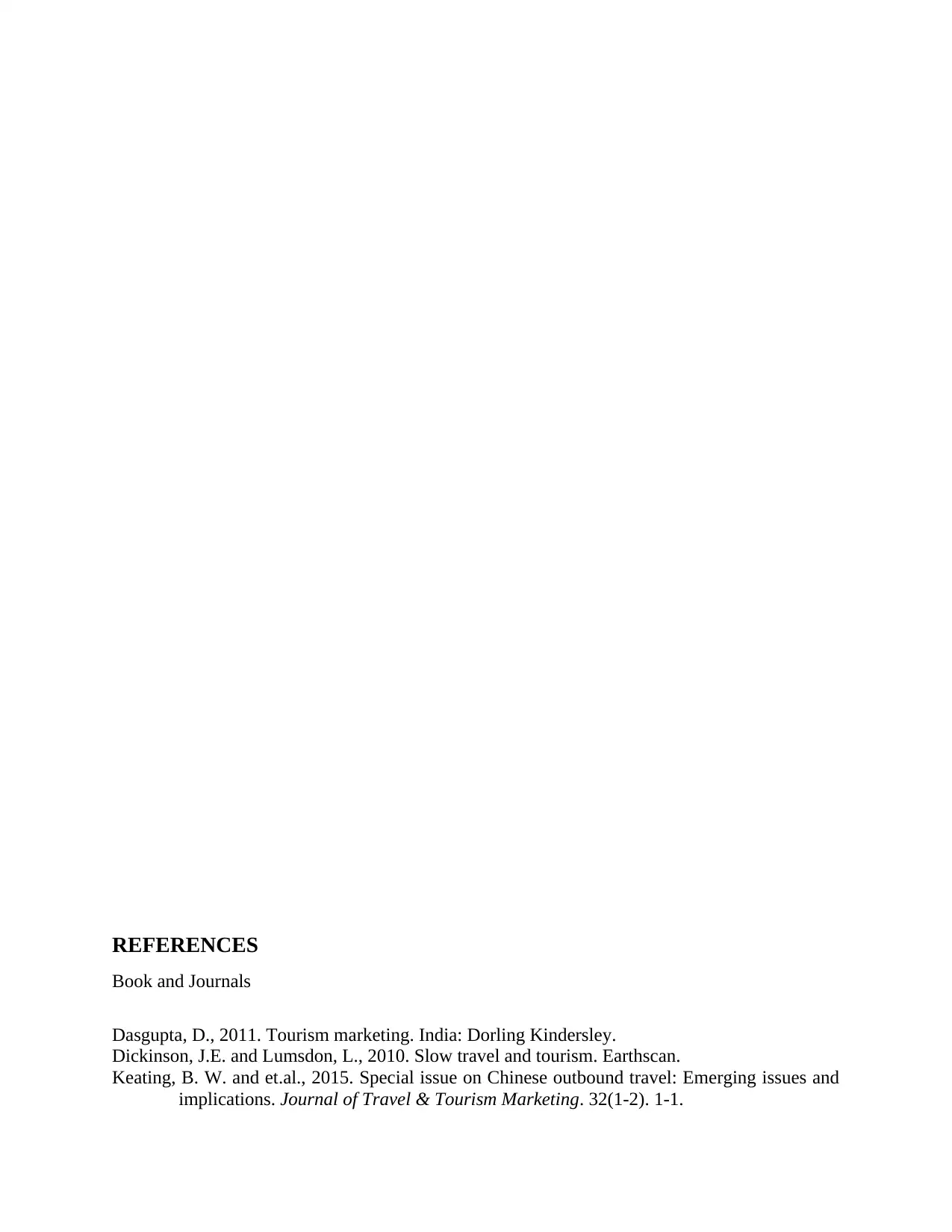
REFERENCES
Book and Journals
Dasgupta, D., 2011. Tourism marketing. India: Dorling Kindersley.
Dickinson, J.E. and Lumsdon, L., 2010. Slow travel and tourism. Earthscan.
Keating, B. W. and et.al., 2015. Special issue on Chinese outbound travel: Emerging issues and
implications. Journal of Travel & Tourism Marketing. 32(1-2). 1-1.
Book and Journals
Dasgupta, D., 2011. Tourism marketing. India: Dorling Kindersley.
Dickinson, J.E. and Lumsdon, L., 2010. Slow travel and tourism. Earthscan.
Keating, B. W. and et.al., 2015. Special issue on Chinese outbound travel: Emerging issues and
implications. Journal of Travel & Tourism Marketing. 32(1-2). 1-1.
⊘ This is a preview!⊘
Do you want full access?
Subscribe today to unlock all pages.

Trusted by 1+ million students worldwide
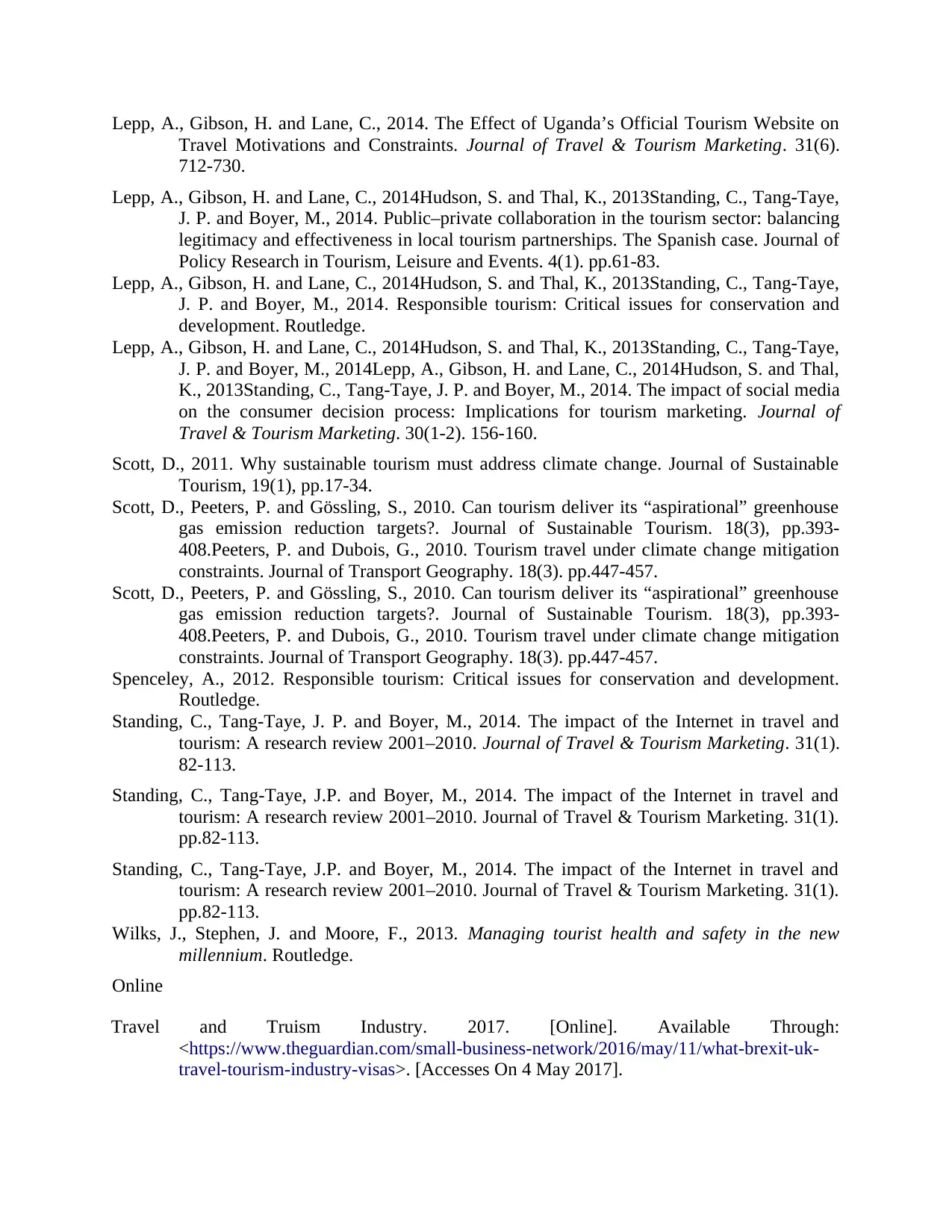
Lepp, A., Gibson, H. and Lane, C., 2014. The Effect of Uganda’s Official Tourism Website on
Travel Motivations and Constraints. Journal of Travel & Tourism Marketing. 31(6).
712-730.
Lepp, A., Gibson, H. and Lane, C., 2014Hudson, S. and Thal, K., 2013Standing, C., Tang-Taye,
J. P. and Boyer, M., 2014. Public–private collaboration in the tourism sector: balancing
legitimacy and effectiveness in local tourism partnerships. The Spanish case. Journal of
Policy Research in Tourism, Leisure and Events. 4(1). pp.61-83.
Lepp, A., Gibson, H. and Lane, C., 2014Hudson, S. and Thal, K., 2013Standing, C., Tang-Taye,
J. P. and Boyer, M., 2014. Responsible tourism: Critical issues for conservation and
development. Routledge.
Lepp, A., Gibson, H. and Lane, C., 2014Hudson, S. and Thal, K., 2013Standing, C., Tang-Taye,
J. P. and Boyer, M., 2014Lepp, A., Gibson, H. and Lane, C., 2014Hudson, S. and Thal,
K., 2013Standing, C., Tang-Taye, J. P. and Boyer, M., 2014. The impact of social media
on the consumer decision process: Implications for tourism marketing. Journal of
Travel & Tourism Marketing. 30(1-2). 156-160.
Scott, D., 2011. Why sustainable tourism must address climate change. Journal of Sustainable
Tourism, 19(1), pp.17-34.
Scott, D., Peeters, P. and Gössling, S., 2010. Can tourism deliver its “aspirational” greenhouse
gas emission reduction targets?. Journal of Sustainable Tourism. 18(3), pp.393-
408.Peeters, P. and Dubois, G., 2010. Tourism travel under climate change mitigation
constraints. Journal of Transport Geography. 18(3). pp.447-457.
Scott, D., Peeters, P. and Gössling, S., 2010. Can tourism deliver its “aspirational” greenhouse
gas emission reduction targets?. Journal of Sustainable Tourism. 18(3), pp.393-
408.Peeters, P. and Dubois, G., 2010. Tourism travel under climate change mitigation
constraints. Journal of Transport Geography. 18(3). pp.447-457.
Spenceley, A., 2012. Responsible tourism: Critical issues for conservation and development.
Routledge.
Standing, C., Tang-Taye, J. P. and Boyer, M., 2014. The impact of the Internet in travel and
tourism: A research review 2001–2010. Journal of Travel & Tourism Marketing. 31(1).
82-113.
Standing, C., Tang-Taye, J.P. and Boyer, M., 2014. The impact of the Internet in travel and
tourism: A research review 2001–2010. Journal of Travel & Tourism Marketing. 31(1).
pp.82-113.
Standing, C., Tang-Taye, J.P. and Boyer, M., 2014. The impact of the Internet in travel and
tourism: A research review 2001–2010. Journal of Travel & Tourism Marketing. 31(1).
pp.82-113.
Wilks, J., Stephen, J. and Moore, F., 2013. Managing tourist health and safety in the new
millennium. Routledge.
Online
Travel and Truism Industry. 2017. [Online]. Available Through:
<https://www.theguardian.com/small-business-network/2016/may/11/what-brexit-uk-
travel-tourism-industry-visas>. [Accesses On 4 May 2017].
Travel Motivations and Constraints. Journal of Travel & Tourism Marketing. 31(6).
712-730.
Lepp, A., Gibson, H. and Lane, C., 2014Hudson, S. and Thal, K., 2013Standing, C., Tang-Taye,
J. P. and Boyer, M., 2014. Public–private collaboration in the tourism sector: balancing
legitimacy and effectiveness in local tourism partnerships. The Spanish case. Journal of
Policy Research in Tourism, Leisure and Events. 4(1). pp.61-83.
Lepp, A., Gibson, H. and Lane, C., 2014Hudson, S. and Thal, K., 2013Standing, C., Tang-Taye,
J. P. and Boyer, M., 2014. Responsible tourism: Critical issues for conservation and
development. Routledge.
Lepp, A., Gibson, H. and Lane, C., 2014Hudson, S. and Thal, K., 2013Standing, C., Tang-Taye,
J. P. and Boyer, M., 2014Lepp, A., Gibson, H. and Lane, C., 2014Hudson, S. and Thal,
K., 2013Standing, C., Tang-Taye, J. P. and Boyer, M., 2014. The impact of social media
on the consumer decision process: Implications for tourism marketing. Journal of
Travel & Tourism Marketing. 30(1-2). 156-160.
Scott, D., 2011. Why sustainable tourism must address climate change. Journal of Sustainable
Tourism, 19(1), pp.17-34.
Scott, D., Peeters, P. and Gössling, S., 2010. Can tourism deliver its “aspirational” greenhouse
gas emission reduction targets?. Journal of Sustainable Tourism. 18(3), pp.393-
408.Peeters, P. and Dubois, G., 2010. Tourism travel under climate change mitigation
constraints. Journal of Transport Geography. 18(3). pp.447-457.
Scott, D., Peeters, P. and Gössling, S., 2010. Can tourism deliver its “aspirational” greenhouse
gas emission reduction targets?. Journal of Sustainable Tourism. 18(3), pp.393-
408.Peeters, P. and Dubois, G., 2010. Tourism travel under climate change mitigation
constraints. Journal of Transport Geography. 18(3). pp.447-457.
Spenceley, A., 2012. Responsible tourism: Critical issues for conservation and development.
Routledge.
Standing, C., Tang-Taye, J. P. and Boyer, M., 2014. The impact of the Internet in travel and
tourism: A research review 2001–2010. Journal of Travel & Tourism Marketing. 31(1).
82-113.
Standing, C., Tang-Taye, J.P. and Boyer, M., 2014. The impact of the Internet in travel and
tourism: A research review 2001–2010. Journal of Travel & Tourism Marketing. 31(1).
pp.82-113.
Standing, C., Tang-Taye, J.P. and Boyer, M., 2014. The impact of the Internet in travel and
tourism: A research review 2001–2010. Journal of Travel & Tourism Marketing. 31(1).
pp.82-113.
Wilks, J., Stephen, J. and Moore, F., 2013. Managing tourist health and safety in the new
millennium. Routledge.
Online
Travel and Truism Industry. 2017. [Online]. Available Through:
<https://www.theguardian.com/small-business-network/2016/may/11/what-brexit-uk-
travel-tourism-industry-visas>. [Accesses On 4 May 2017].
Paraphrase This Document
Need a fresh take? Get an instant paraphrase of this document with our AI Paraphraser
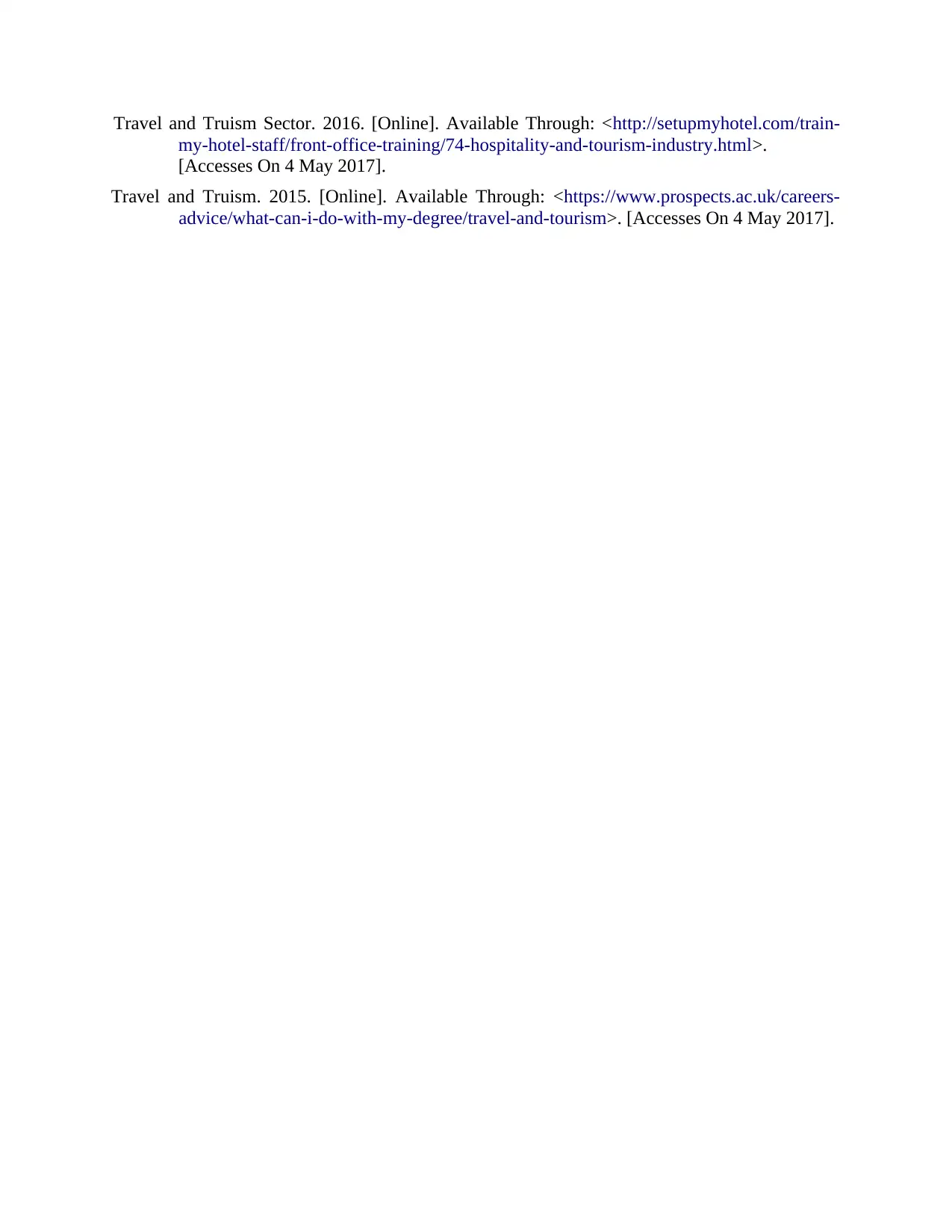
Travel and Truism Sector. 2016. [Online]. Available Through: <http://setupmyhotel.com/train-
my-hotel-staff/front-office-training/74-hospitality-and-tourism-industry.html>.
[Accesses On 4 May 2017].
Travel and Truism. 2015. [Online]. Available Through: <https://www.prospects.ac.uk/careers-
advice/what-can-i-do-with-my-degree/travel-and-tourism>. [Accesses On 4 May 2017].
my-hotel-staff/front-office-training/74-hospitality-and-tourism-industry.html>.
[Accesses On 4 May 2017].
Travel and Truism. 2015. [Online]. Available Through: <https://www.prospects.ac.uk/careers-
advice/what-can-i-do-with-my-degree/travel-and-tourism>. [Accesses On 4 May 2017].
1 out of 11
Related Documents
Your All-in-One AI-Powered Toolkit for Academic Success.
+13062052269
info@desklib.com
Available 24*7 on WhatsApp / Email
![[object Object]](/_next/static/media/star-bottom.7253800d.svg)
Unlock your academic potential
Copyright © 2020–2025 A2Z Services. All Rights Reserved. Developed and managed by ZUCOL.





